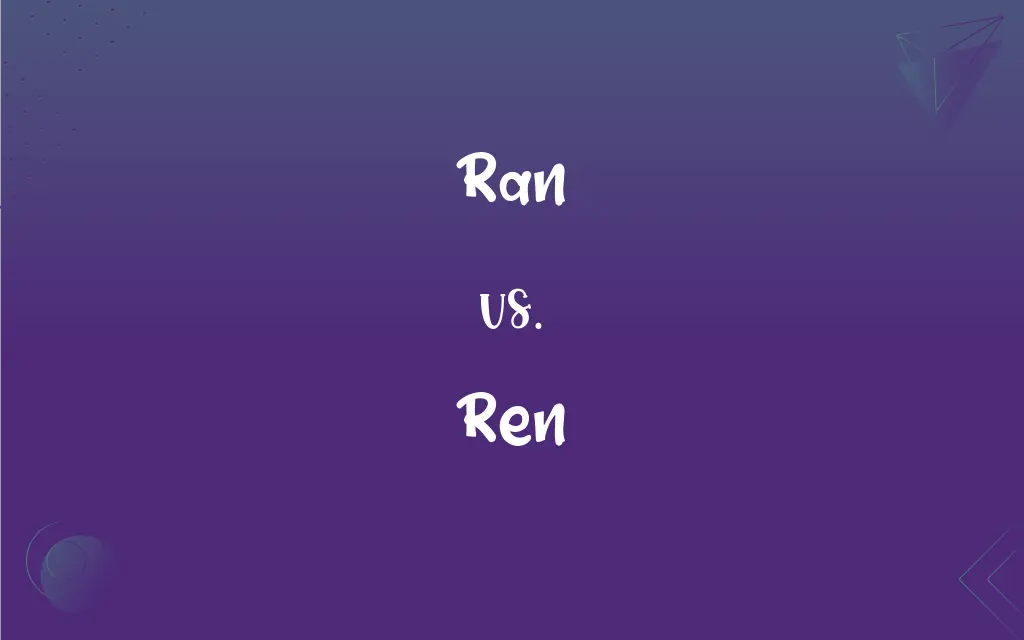Ran vs. Ren: What's the Difference?
By Aimie Carlson || Updated on May 20, 2024
"Ran" is the past tense of the verb "run," while "Ren" is a common given name in various cultures, including Japan and China.

Key Differences
Ran is the past tense of the verb "run." It is used to describe an action that was completed in the past. For example, "She ran to the store yesterday." This form is straightforward and commonly used in both spoken and written English to indicate past actions involving running. Ren, on the other hand, is a name rather than a verb. It is used as a given name in multiple cultures. In Japan, Ren is a popular unisex name, meaning "lotus" or "love." In China, Ren (仁) often signifies "benevolence" or "humanity" and is a common surname or given name. The usage of Ren as a name reflects cultural meanings and traditions, differing significantly from the action-oriented nature of "ran."
Ran is strictly related to the physical action of running and is only used in contexts that discuss movement or the completion of running. It is a vital part of English grammar, helping to frame narratives in the past tense. In contrast, Ren as a name does not imply any action but rather serves as an identifier for individuals. It can carry various connotations based on cultural and linguistic contexts. For instance, in Japanese culture, names like Ren can have significant meanings tied to nature or emotions.
Ran is also used in idiomatic expressions and phrases, such as "ran out of time" or "ran into trouble," expanding its use beyond literal running. These idioms often describe situations metaphorically, indicating the versatility of the verb. Whereas Ren, being a proper noun, is primarily used in personal identification and carries cultural significance. It does not change form or tense, maintaining its structure and meaning across different contexts where it is used as a name.
Comparison Chart
Part of Speech
Verb (past tense of "run")
Proper noun (given name)
Usage
Describes past action of running
Used as a name in various cultures
ADVERTISEMENT
Context
Action-oriented, related to physical movement
Personal identification, cultural significance
Example Context
"She ran to the store."
"Ren is a popular name in Japan."
Grammar
Changes tense (run, ran, running)
Does not change form, remains a proper noun
Ran and Ren Definitions
Ran
The past tense of run.
She ran five miles yesterday.
Ren
A given name in Japanese meaning "lotus" or "love."
Ren enjoys painting landscapes.
ADVERTISEMENT
Ran
Moved quickly on foot.
He ran to catch the bus.
Ren
A Chinese given name or surname meaning "benevolence."
Ren Li is known for his charitable work.
Ran
Operated or functioned.
The car ran smoothly after the repair.
Ren
A character name in literature or media.
Ren is a character in the anime series.
Ran
Flowed or streamed.
The river ran through the valley.
Ren
A popular unisex name in various cultures.
Ren is a common name for both boys and girls.
Ran
Extended or stretched.
The road ran through the forest.
Ren
A name with multiple cultural significances.
Ren symbolizes kindness in Chinese philosophy.
Ran
The goddess of the sea.
Ren
(anatomy) A kidney.
Ran
Past tense of run.
Ren
(Egyptian mythology) One’s name, as part of the soul in ancient Egyptian mythology.
Ran
Open robbery.
Ren
See Renne.
Ran
Yarns coiled on a spun-yarn winch.
Ren
A run.
FAQs
Can "ran" be used in idioms?
Yes, for example, "ran out of time."
What does "ran" mean?
"Ran" is the past tense of the verb "run."
Is "Ren" gender-specific?
No, Ren is often a unisex name.
Where is the name "Ren" commonly used?
It is common in Japan and China.
How do you use "ran" in a sentence?
e.g., She ran to the park this morning.
Does "ran" have other meanings besides running?
Yes, it can mean operated, extended, or flowed.
What is the cultural significance of the name "Ren"?
In Japan, it means "lotus" or "love"; in China, it means "benevolence."
Can "ran" be used metaphorically?
Yes, for example, "ran into a problem."
Is "Ren" used in literature?
Yes, Ren is often used as a character name.
Does "ran" change form in different tenses?
Yes, present: run; past: ran; continuous: running.
Is "Ren" a verb?
No, "Ren" is a proper noun, typically a given name.
Is "Ren" a common surname?
Yes, especially in China.
What does "Ren" symbolize in Chinese culture?
It symbolizes benevolence and humanity.
How is "Ren" pronounced?
It is pronounced as /ren/.
Is "ran" used in technical contexts?
Yes, such as "ran a program."
How do you spell the past tense of "run"?
R-A-N.
Can "ran" describe non-physical movement?
Yes, such as "ran a business."
Is "Ren" used in other cultures besides Japan and China?
Yes, it can be found in various cultures as a name.
Can "Ren" be a fictional character's name?
Yes, it is often used in books, movies, and TV shows.
Is "ran" always past tense?
Yes, it is the past tense form of "run."
About Author
Written by
Aimie CarlsonAimie Carlson, holding a master's degree in English literature, is a fervent English language enthusiast. She lends her writing talents to Difference Wiki, a prominent website that specializes in comparisons, offering readers insightful analyses that both captivate and inform.































































